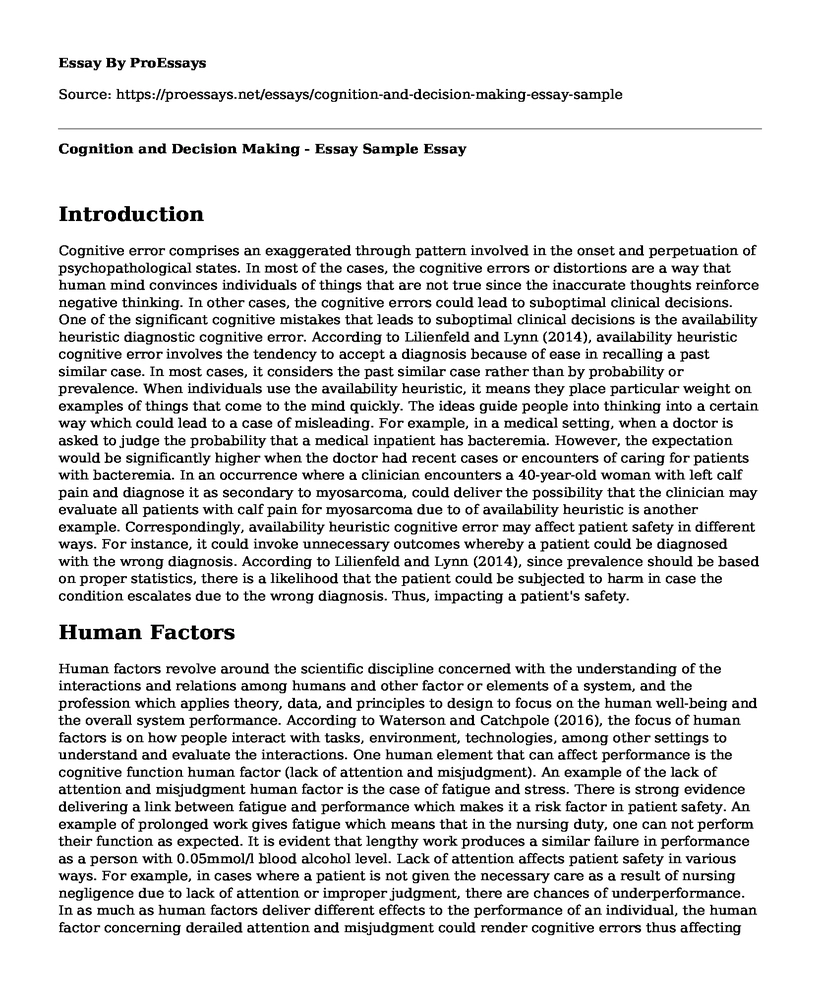Introduction
Cognitive error comprises an exaggerated through pattern involved in the onset and perpetuation of psychopathological states. In most of the cases, the cognitive errors or distortions are a way that human mind convinces individuals of things that are not true since the inaccurate thoughts reinforce negative thinking. In other cases, the cognitive errors could lead to suboptimal clinical decisions. One of the significant cognitive mistakes that leads to suboptimal clinical decisions is the availability heuristic diagnostic cognitive error. According to Lilienfeld and Lynn (2014), availability heuristic cognitive error involves the tendency to accept a diagnosis because of ease in recalling a past similar case. In most cases, it considers the past similar case rather than by probability or prevalence. When individuals use the availability heuristic, it means they place particular weight on examples of things that come to the mind quickly. The ideas guide people into thinking into a certain way which could lead to a case of misleading. For example, in a medical setting, when a doctor is asked to judge the probability that a medical inpatient has bacteremia. However, the expectation would be significantly higher when the doctor had recent cases or encounters of caring for patients with bacteremia. In an occurrence where a clinician encounters a 40-year-old woman with left calf pain and diagnose it as secondary to myosarcoma, could deliver the possibility that the clinician may evaluate all patients with calf pain for myosarcoma due to of availability heuristic is another example. Correspondingly, availability heuristic cognitive error may affect patient safety in different ways. For instance, it could invoke unnecessary outcomes whereby a patient could be diagnosed with the wrong diagnosis. According to Lilienfeld and Lynn (2014), since prevalence should be based on proper statistics, there is a likelihood that the patient could be subjected to harm in case the condition escalates due to the wrong diagnosis. Thus, impacting a patient's safety.
Human Factors
Human factors revolve around the scientific discipline concerned with the understanding of the interactions and relations among humans and other factor or elements of a system, and the profession which applies theory, data, and principles to design to focus on the human well-being and the overall system performance. According to Waterson and Catchpole (2016), the focus of human factors is on how people interact with tasks, environment, technologies, among other settings to understand and evaluate the interactions. One human element that can affect performance is the cognitive function human factor (lack of attention and misjudgment). An example of the lack of attention and misjudgment human factor is the case of fatigue and stress. There is strong evidence delivering a link between fatigue and performance which makes it a risk factor in patient safety. An example of prolonged work gives fatigue which means that in the nursing duty, one can not perform their function as expected. It is evident that lengthy work produces a similar failure in performance as a person with 0.05mmol/l blood alcohol level. Lack of attention affects patient safety in various ways. For example, in cases where a patient is not given the necessary care as a result of nursing negligence due to lack of attention or improper judgment, there are chances of underperformance. In as much as human factors deliver different effects to the performance of an individual, the human factor concerning derailed attention and misjudgment could render cognitive errors thus affecting patient safety.
References
Lilienfeld, S. O., & Lynn, S. J. (2014). Errors/biases in clinical decision making. The encyclopedia of clinical psychology, 1-9. Doi:10.1002/9781118625392.wbecp567
Waterson, P., & Catchpole, K. (2016). Human factors in healthcare: welcome progress, but still scratching the surface. BMJ Qual Saf, 25(7), 480-484. Doi:10.1136/bmjqs-2015-005074
Cite this page
Cognition and Decision Making - Essay Sample. (2022, Dec 08). Retrieved from https://proessays.net/essays/cognition-and-decision-making-essay-sample
If you are the original author of this essay and no longer wish to have it published on the ProEssays website, please click below to request its removal:
- Essay Example on Management: Leadership Challenge in an Organization
- SWOT Analysis and Strategic Planning Paper Example
- Statements About Power and Knowledge Paper Example
- Paper Example on Modern Rangers: Ethics and Leadership
- Project Management Annotated Bibliography
- Comparison Between What-if Analysis and Goal Seeking Essay
- Essay on Theory-Based Risk Management: Conflict, Organizational Behavior & Vulnerability







